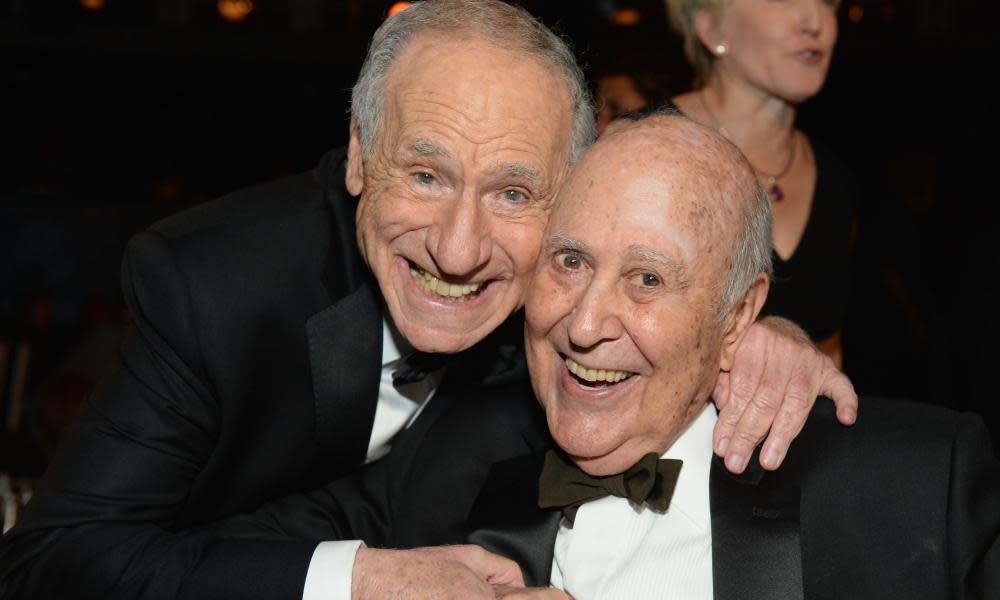The best interviewees? Give me an actor in their winter years with a few scores to settle

It was just by chance that I was the last person to interview comedy legend Carl Reiner, who died last week, four months after I spent an evening with him and his best friend, Mel Brooks, at Reiner’s home in Beverly Hills. This was not my first final interview: I’m pretty sure I was the last journalist to interview Burt Reynolds, and I was surely the last to interview Kirk Douglas, 100 when I met him, in his home, just down the road from Reiner’s.
It’s possible there were more. It’s a professional peril if you prefer to interview the old rather than the young, as I do. Once a celebrity gets over 70, they shake off whatever shackles of propriety once contained them and really enjoy themselves. If you imagine it’s people like Johnny Depp or Mickey Rourke who give publicists headaches, you’ve never met a celebrity in their winter years with a few scores to settle.
Just looking back on interviews I’ve done in the past three months, there was Woody Allen (84), more than happy to not bother promoting his movie and talk for an hour instead about his battles – to put it mildly – with his ex-partner Mia Farrow, which fascinated me, less so the film distributor, which later made its displeasure known. Then there was the royal memoirist Anne Glenconner (87), eagerly – despite her publisher’s warnings against it – dishing the dirt on Meghan Markle.
But this is not to flatten older people into a twinkly eyed, cheeky, homogeneous whole. Reynolds, then 80, arrived limping, leaning heavily on a cane and in palpable pain. As I said hello, he took his soon omnipresent bottle of pills out of his pocket, crushed two on the table between us with his fist, and snorted them. The pills soothed his pain but addled his mind, and, during our interview, in which he dutifully trotted out anecdotes as though he were a dancing monkey and I the baying crowd, he started to cry. He was, it was said, bankrupt, and all he had left were his memories, and even those he had to flog. It was a heartbreaking glimpse into how pitiless life can be, even – maybe especially – to the once golden and beautiful.
Reiner, 98, was in every way the opposite. He faced his later years with no regrets. One of his last tweets, posted 48 hours before his death was: “Nothing pleases me more than knowing that I have lived the best life possible by having met & marrying the gifted Estelle (Stella) Lebost, who partnered with me in bringing Rob, Annie & Lucas Reiner into to [sic] this needy & evolving world.” Evidence of this best life was apparent from the moment I walked into his home, where he had lived since the 1960s with Estelle, who died in 2008. Every available surface seemed to be covered with photographs of four generations of Reiners, and his daughter, Annie, was just leaving, having come over for a visit. Brooks, his best friend of 70 years, was waiting in the living room for their nightly dinner date in front of the TV gameshow, Jeopardy!
“Relationship goals” is what people say on social media about pictures of beautiful, loved-up celebrities. Reiner and Brooks are my relationship goal. I can think of no purer bliss than knowing, even at 98, I will never be alone because my best friend is right beside me in the armchair next to mine, every night. Sitting opposite them, Brooks and Reiner’s friendship looked even more enviable; it was, simply, a love story. Reiner’s body – that annoying outer casing with cruelly built-in obsolescence – was starting to let him down, but he and Brooks still got such a kick out of each other. Afterwards, Reiner sent me some beautifully written messages about his forthcoming projects, and we talked about getting him a column in the Guardian. He seemed so unstoppable, I worried what he and Brooks would watch over dinner if they outlived Jeopardy! Last year its host, Alex Trebek, announced he has cancer. It turned out, I didn’t need to worry.
Related: 'Love and free food': Mel Brooks and Carl Reiner share the secrets of their 70-year friendship
When I heard about Reiner, I thought of Brooks, left behind. I don’t know if Reiner realised he was probably giving me his last interview, but I suspect Brooks did. “The thought of being without him – the world would be too bleak!” Reiner said, and Brooks looked down and took his hand. When I interviewed Kirk Douglas I caught glimpses of another man watching us anxiously through the back window; I later found out it was his son, Michael, visiting his dad and keeping an eye on proceedings. This is the downside to interviewing older people: while they have generally come to terms with their proximity to the end, you see that those around them have not.
I never regret the interviews I’ve done, only those I haven’t. Katherine Hepburn, John Hughes, Robin Williams, Harold Ramis, Robert Evans, Bea Arthur, Nora Ephron – all were alive when I started working as a journalist, but by the time I realised I ought to interview them, it was too late. Interviewing someone towards the end of their life is an unforgettable gift: they have little to gain, but they are giving you their time, and there is no commodity more valuable. In a corner of my heart, I will always be watching Reiner and Brooks laughing together in their armchairs. What more could any heaven offer?

 Yahoo News
Yahoo News 
